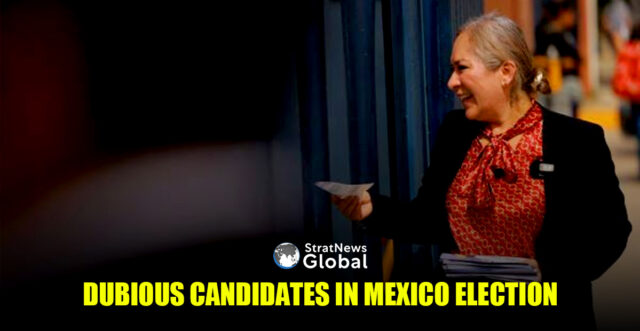As voters in Mexico’s Durango state prepare for the country’s first-ever judicial elections next weekend, one of the candidates for federal judge is Leopoldo Chavez — a man who previously spent nearly six years in a U.S. prison.
Chavez was convicted on drug offenses: for smuggling over 4 kilograms of methamphetamines in 2015. Durango is part of Mexico’s Golden Triangle, a cartel-controlled region growing marijuana and opium poppies.
“I’ve never sold myself as the perfect candidate,” Chavez said in a video he shared on Facebook. He said he had nothing to hide and had served his time.
In the nearby Pacific coast state of Jalisco, Francisco Hernandez is running to be a criminal magistrate even though the last time he served as a judge he was dismissed by the Federal Judiciary Council after an investigation into allegations of sexual abuse and corruption.
“Does being an advisor on international or extradition law give you a bad public reputation? I don’t think so, since that’s the only thing that demonstrates that you have the ability and knowledge to handle these types of situations,” Escamilla said.
Serious Concerns
Ahead of the elections on June 1, civil organizations, judge associations and some Mexican lawmakers are raising serious concerns about a vote that critics warn could jeopardize the country’s rule of law.
The controversial judicial overhaul was proposed by leftist former President Andres Manuel Lopez Obrador and supported by his protege, President Claudia Sheinbaum. Both said it would root out corruption in Mexico’s flawed judiciary and allow the people to decide who should be a judge.
Around 5,000 candidates are vying for more than 840 federal positions, including all Supreme Court justices.
But with the vote just over a week away, Mexican rights group Defensorxs says it has identified about 20 people vying for positions that have criminal indiscretions, corruption allegations against them or past links to cartels, including a defence lawyer who represented drug kingpin Joaquin ‘El Chapo’ Guzman.
Defensorxs president Miguel Meza said that the candidates his organization had flagged revealed grave flaws in the government vetting system, which was meant to verify eligibility criteria including: Mexican citizenship by birth, a bachelor’s degree in law, “good reputation,” and a record clean of serious crime.
Meza said aspiring judges were apparently not screened for foreign convictions or who they had legally represented. He put much of the problem down to rushing the election.
“Everything we’re seeing is the result of trying to fast-track this reform,” Meza said.
A Mexican association of magistrates and judges, JUFED, said the list of controversial candidates confirms its view that the reform is a threat to judicial independence in Mexico.
“What’s happening with the election is dangerous,” said JUFED national director Juana Fuentes. “There is a serious risk that criminal interests or groups, or people representing them, could become involved.”
Professional Duty
Candidates cannot use campaign materials that link them to a political party, participate in events organized by political parties or accept donations of any kind.
Perhaps the candidate who has garnered the most headlines is Silvia Delgado, who represented the notorious El Chapo, former chief of the Sinaloa Cartel, in 2016. She visited him weekly in prison to share updates before he was extradited to the United States and eventually sentenced to life in prison.
Now, she hopes to become a criminal court judge in Chihuahua.
“I’m not corrupt,” she said, “they can’t burn you for having represented someone.”
“The best legacy I can give, as a human being and for my children and grandchildren, is to have been a person of integrity, who always defended people.”
She said she considers her work representing El Chapo, which included filing a petition that he be provided a blanket in prison, to be in line with her professional duties.
She kept her harshest words for activist Meza, describing him as “irresponsible” and running a “Robin Hood group” bent on “directly attacking me.”
Meza said Defensorxs was not interested in “attacking” any candidate, but exposing the risks associated with them.
“Our goal is to inform the public about these risks so they can take them into account when exercising their right to vote.”
“It seems clear to us that this risk exists in Silvia Delgado’s case,” he added. However, he did not identify other concerns apart from her legal work for El Chapo.
Media War
Senate leader Gerardo Fernandez Norona, a powerful member of the ruling party, said the focus on the eligibility of certain candidates was a “racist, classist” media war aimed at discrediting the elections.
“It’s not important. It’s not relevant,” Norona said, adding that people found ineligible could be withdrawn after the vote.
The INE electoral authority has made it clear that names cannot be removed ahead of the vote.
Claudia Zavala, an electoral advisor at INE, said the body should have been included earlier in the vetting process, which was conducted by committee members selected by Congress, the judicial power and the executive branch of government.
“It seems that splitting that function around other authorities was not ideal,” she said.
Now, all that can be done by INE is a post-election review of any formal complaints about candidates in order to prove a person is ineligible to hold office, Zavala said. If a winner does not meet the requirements, the role would go to the second-placed finisher.
However, any investigation into a candidate’s eligibility must be completed by June 15, Zavala said, when election results are finalized and positions confirmed.
“The evidence must be very clear,” she said.
(With inputs from Reuters)





